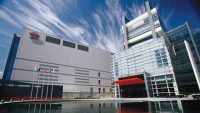TSMC Seeks $15 Billion in U.S. Incentives to Build Foundries
April 21, 2023
Taiwan’s TSMC, the largest semiconductor manufacturer in the world, is seeking $15 billion in U.S. subsidies to help build two chip factories in Arizona, but is pushing back against terms that include sharing detailed information about its stateside operations and possibly profits. Some South Korean semiconductor firms are also said to have raised objections. The White House contends the criteria are in place to protect American taxpayers and ensure the subsidies are being spent as intended. TSMC has pledged $40 billion of its own funds for the project.
That’s nearly as much as the $53 billion the 2022 CHIPS Act has designated to seed stateside semiconductor manufacturing. The experiment in U.S. industrial policy is uncharted waters for the Biden administration and chipmakers.

TSMC chairman Mark Liu told industry associates at a meeting in Taiwan last month that “some of the conditions are unacceptable and we aim to mitigate any negative impact from these and will continue discussions with the U.S. government,” according to The Wall Street Journal.
The Commerce Department’s position is that trade secrets and other business information will be kept confidential, and profit-sharing will only kick in if a subsidized plant’s cash flow exceeds projections. TSMC is already underway with construction on the Arizona plants, which are expected to begin production in 2024.
The company expects to receive tax credits of $7-8 billion as part of the CHIPS Act, and another $6-7 billion in grants, which would put total U.S. investment in the area of $15 billion as it seeks to rebuild a U.S. chip manufacturing sector for national security reasons.
American companies Intel and Micron are among those teeing up to cash in on CHIPS. South Korea’s Samsung Electronics and SK Hynix are also assessing whether to seek U.S. incentives for U.S. operations.
Chipmakers who receive more than $150 million in government funding “have to share a portion of their investment returns if those returns exceed projections,” writes WSJ, adding the provision is “likely to be subject to tough negotiations.”
The government’s transparency requirements are another sticking point. “As a contract chipmaker for clients like Apple Inc., TSMC is privy to business plans and product blueprints for many of the world’s top consumer technology companies,” WSJ reports, noting “the company tightly guards its chipmaking recipes, including the types of machines and materials it uses, to prevent competitors from mimicking it.”
TSMC just adjusted its investor guidance, “predicting its first full-year revenue drop since 2009 after lowering its outlook for this year due to weak demand and persistently high inventory levels,” according to Nikkei Asia.
Related:
A Tech Industry Pioneer Sees a Way for the U.S. to Lead in Advanced Chips, The New York Times, 4/19/23
Taiwan Quietly Urges U.S. to Calm Rhetoric on China Chip Risk, Bloomberg, 4/20/23

No Comments Yet
You can be the first to comment!
Leave a comment
You must be logged in to post a comment.